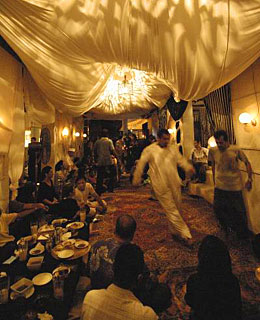
FRIENDLY OASIS: Music nights at the Samar are multicultural
The Samar Café is a pungent reminder of what Singapore was and still is: a cultural crossroads where three great civilizations, Chinese, Indian and Islamic, came together nearly two centuries ago and have coexisted since, largely without rancor. It is an untidy place of chipped marble-topped tables and fading Afghan rugs, but the Cairo-coffee-house look isn't contrived. It reflects the rich Islamic history of the immediate neighborhood. Towering over the Samar is the minaret of Singapore's largest mosque. And across the road lies the last palace of the Sultan of Johor, who negotiated Singapore's sale (for a pittance) to Stamford Raffles' British East India Company in 1819.
If the Sultan cut a bad deal, his neighbors and descendants have stopped fretting about it. On Friday and Saturday nights, half a dozen men sit upstairs at the Samar to relive the area's glory days by performing North African music (occasionally a Hindi film song creeps into their repertoire, but usually nobody notices). Bearded men in white robes dance joyously, while an audience of Chinese, Indians and Malays pull at shisha pipes and sample the milky Egyptian desserts that are the house's pride.
On such evenings it is impossible not to appreciate the irony of the Samar's address, located as it is at the intersection of Kandahar and Baghdad streets. There is no sound of machine-gun fire here, however, or the mournful wail of ambulances. Just the thump of the drums, the mesmerizing cry of full-throated Arabic, and the applause of a culturally diverse audience brought together through the power of song.
—By Neel Chowdhury